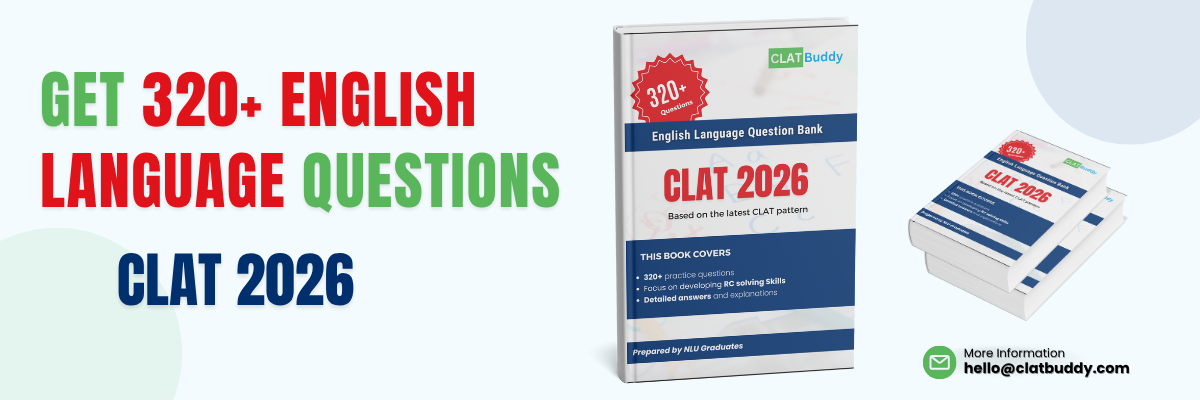100 Important Vocabulary for CLAT

To excel in the Common Law Admission Test (CLAT), developing a strong command over important vocabulary for CLAT is crucial. A robust vocabulary enhances comprehension skills and enables effective communication and articulation.
This article presents a comprehensive list of 100 important vocabulary words for CLAT to assist you in your CLAT preparation. By incorporating these words into your study routine, you can significantly improve your chances of success.
Let’s delve into this essential collection of words and their meanings to empower your language skills for the CLAT.
- Abrogate: To abolish or repeal formally.
- Accrue: To accumulate or grow over time.
- Adjudicate: To make a formal judgment or decision.
- Advocate: To support or recommend publicly.
- Alacrity: Eagerness or willingness to do something.
- Ameliorate: To make something better or improve.
- Antithesis: Direct contrast or opposite.
- Arbitrary: Based on random choice or personal preference.
- Articulate: To express or communicate clearly.
- Assuage: To make it less intense or alleviate.
- Banal: Lacking originality or freshness; dull.
- Belie: To give a false impression of; contradict.
- Benevolent: Kind or well-meaning.
- Capricious: Impulsive or unpredictable in behaviour.
- Clandestine: Kept secret or done secretly.
- Coerce: To force or compel someone to do something.
- Cognizant: Aware or conscious of something.
- Conjecture: A guess or inference based on incomplete evidence.
- Conundrum: A confusing or difficult problem.
- Corroborate: To confirm or give support to a statement or theory.
- Culpable: Deserving blame or censure.
- Deleterious: Harmful or damaging.
- Demarcate: To set the boundaries or limits of something.
- Deprecate: To express disapproval of or criticize.
- Diligent: Hardworking and careful in one’s work.
- Disparity: A significant difference or inequality.
- Disseminate: To spread or disperse widely.
- Divulge: To reveal or make known.
- Egregious: Outstandingly bad or shocking.
- Eloquent: Fluent and persuasive in speaking or writing.
- Emulate: To imitate or match the qualities of someone or something.
- Enigma: A puzzling or mysterious person or thing.
- Epitome: A perfect example or embodiment of something.
- Erudite: Having or showing great knowledge or learning.
- Exonerate: To clear from blame or accusation.
- Exorbitant: Unreasonably high or excessive.
- Expunge: To erase or remove completely.
- Extol: To praise or glorify.
- Facilitate: To make an action or process easier or smoother.
- Fallacy: A false or mistaken belief.
- Formidable: Inspiring fear or respect due to size, power, or strength.
- Frivolous: Not having any serious purpose or value.
- Gregarious: Fond of the company; sociable.
- Hackneyed: Lacking originality or freshness; overused.
- Hierarchy: A system or organization in which people or groups are ranked according to status or authority.
- Immutable: Unchanging over time; unalterable.
- Impartial: Treating all people and groups equally, fair, and just.
- Impede: To obstruct or hinder the progress of something.
- Incessant: Continuing without interruption.
- Incumbent: Necessary as a duty or responsibility.
- Indict: To formally accuse or charge with a serious crime.
- Indolent: Lazy or disinclined to work.
- Infallible: Incapable of making mistakes or being wrong.
- Innocuous: Not harmful or offensive; harmless.
- Insidious: Proceeding subtly or gradually but with harmful effects.
- Intrepid: Fearless and adventurous.
- Inundate: To overwhelm or flood with a large quantity of something.
- Invoke: To call upon or cite as authority or justification.
- Irresolute: Uncertain or hesitating; indecisive.
- Juxtapose: To place side by side for comparison or contrast.
- Lament: To express grief, sorrow, or regret.
- Lucid: Clear and easily understood.
- Meticulous: Showing great attention to detail; thorough.
- Mitigate: To make less severe or intense; alleviate.
- Nefarious: Wicked or criminal in nature.
- Nominal: Existing in name only; very small or insignificant.
- Obsolete: No longer in use or relevant.
- Ostracize: To exclude or reject from a group or society.
- Paradox: A statement or situation that contradicts itself but may be true.
- Pernicious: Having a harmful effect, especially gradually or subtly.
- Plausible: Seemingly reasonable or probable.
- Pragmatic: Dealing with things sensibly and realistically.
- Precarious: Not securely held or in position; uncertain.
- Precedent: An earlier event or action regarded as an example or guide for future events.
- Pristine: In its original condition, unspoiled or untouched.
- Proponent: A person who advocates for a theory, proposal, or project.
- Prudent: Acting with or showing care and thought for the future.
- Rationale: A set of reasons or logic behind a particular course of action.
- Relegate: To dismiss or demote to an inferior rank or position.
- Remedy: A solution or cure for a problem or difficulty.
- Resilient: Able to recover quickly from difficulties or tough situations.
- Rhetoric: The art of effective or persuasive speaking or writing.
- Salient: Most noticeable or important; prominent.
- Scrutinize: To examine or inspect closely and thoroughly.
- Serendipity: The occurrence of fortunate or unexpected events by chance.
- Soporific: Tending to induce sleep or lethargy.
- Spurious: Not genuine, authentic, or true; false or fake.
- Substantiate: To provide evidence or support for the truth or validity of something.
- Superfluous: Exceeding what is necessary or required; extra or surplus.
- Tenacious: Persistent or determined to hold on to something.
- Transient: Lasting for only a short time; temporary.
- Ubiquitous: Present, appearing, or found everywhere.
- Unprecedented: Never done or experienced before.
- Vehement: Showing strong feelings or intense passion.
- Veracity: Accuracy or truthfulness of something.
- Vicarious: Experienced or felt by imagining being in someone else’s place.
- Vilify: To speak or write about someone in an abusive or negative manner.
- Vindicate: To clear someone of blame or suspicion.
- Whimsical: Playfully quaint or fanciful, especially appealingly or amusingly.
- Zealot: A person who is passionate and uncompromising in pursuit of their religious, political, or other beliefs.
The acquisition of an extensive vocabulary is indispensable for excelling in the CLAT. Incorporating the important CLAT vocabulary presented in this article can enhance your comprehension, communication, and writing skills.
Remember to practice these words in different contexts and actively incorporate them into your daily life. Strengthening your vocabulary will benefit you in the CLAT and your future legal studies and career.
So, make it a priority to expand your lexicon with important vocabulary for CLAT, as it is the key to unlocking success in the CLAT and beyond. Good luck in your CLAT preparation journey!
Calling all law aspirants!
Are you exhausted from constantly searching for study materials and question banks? Worry not!
With over 15,000 students already engaged, you definitely don't want to be left out.
Become a member of the most vibrant law aspirants community out there!
It’s FREE! Hurry!
Join our WhatsApp Groups (Click Here) and Telegram Channel (Click Here) today, and receive instant notifications.







